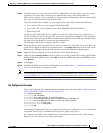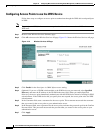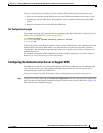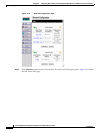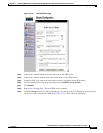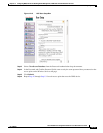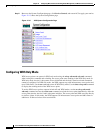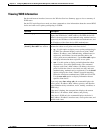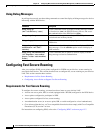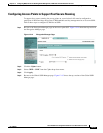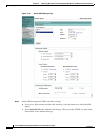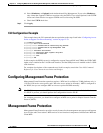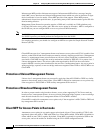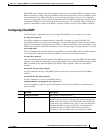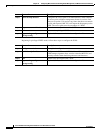
12-21
Cisco IOS Software Configuration Guide for Cisco Aironet Access Points
OL-11350-01
Chapter 12 Configuring WDS, Fast Secure Roaming, Radio Management, and Wireless Intrusion Detection Services
Configuring WDS
Viewing WDS Information
On the web-browser interface, browse to the Wireless Services Summary page to view a summary of
WDS status.
On the CLI in privileged exec mode, use these commands to view information about the current WDS
device and other access points participating in CCKM:
Command Description
show wlccp ap Use this command on access points participating in CCKM to
display the WDS device’s MAC address, the WDS device’s IP
address, the access point’s state (authenticating, authenticated, or
registered), the IP address of the infrastructure authenticator, and
the IP address of the client device (MN) authenticator.
show wlccp wds { ap | mn }
[ detail ] [ mac-addr mac-address ]
On the WDS device only, use this command to display cached
information about access points and client devices.
• ap—Use this option to display access points participating in
CCKM. The command displays each access point’s MAC
address, IP address, state (authenticating, authenticated, or
registered), and lifetime (seconds remaining before the
access point must reauthenticate). Use the mac-addr option
to display information about a specific access point.
• mn—Use this option to display cached information about
client devices, also called mobile nodes. The command
displays each client’s MAC address, IP address, the access
point to which the client is associated (cur-AP), and state
(authenticating, authenticated, or registered). Use the detail
option to display the client’s lifetime (seconds remaining
before the client must reauthenticate), SSID, and VLAN ID.
Use the mac-addr option to display information about a
specific client device.
If you only enter show wlccp wds, the command displays the
access point’s IP address, MAC address, priority, and interface
state (administratively standalone, active, backup, candidate, or
WDS-only).
If the state is backup, the command also displays the current
WDS device’s IP address, MAC address, and priority.
If the state is WDS-only, the command displays the device’s
MAC address, IP address, interface state, access point count, and
mobile node count.



